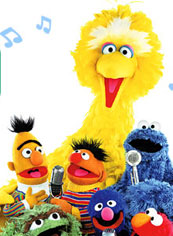 Politicians? Diplomats? World leaders? Does anyone know what to do with the Middle East conflict? It seems to be the consensus that children in the region learn from their parents and the society that surrounds them–and those messages are hard to combat.
Politicians? Diplomats? World leaders? Does anyone know what to do with the Middle East conflict? It seems to be the consensus that children in the region learn from their parents and the society that surrounds them–and those messages are hard to combat.
Unless you’re made of felt.
After more than a decade of having been off the air in Israel, Rehov Sumsum (Sesame Street) is now back, with 15 new episodes, a new Arab-Israeli muppet, and an aim at teaching coexistence.
Producers tailored the Middle Eastern casts and story lines to the fit the audiences. “Rehov Sumsum,” the Israeli version of the show, for the first time includes a muppet of Arab origin. Its Palestinian counterpart, “Shara’a Simsim,” seeks to offer positive role models to boys in the West Bank and Gaza Strip. “It’s really about respect and tolerance,” said Gary Knell, president of Sesame Workshop, the New York-based nonprofit group behind Sesame Street programming worldwide.
“[The show] opens up a new way to deal with issues of conflict, just teaching children how to live together, how to work together with each other despite their differences,” Education Minister Yuli Tamir said at a ceremony in a Jerusalem kindergarten on Sunday. The ceremony followed more than a week of meetings Knell had with top political figures in the region to seek funding and support for local Sesame Street productions.
Much of what children experience is environmental. So even if the television messages are positive and in favor of peace, without parental reinforcement the retention of peaceful messages is unfortunately an uphill battle. One can only hope that the muppet denizens of the Rehov and the Shara’a will help bridge a chasm of conflict.


